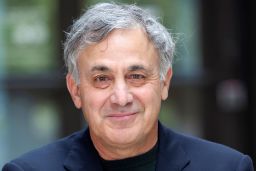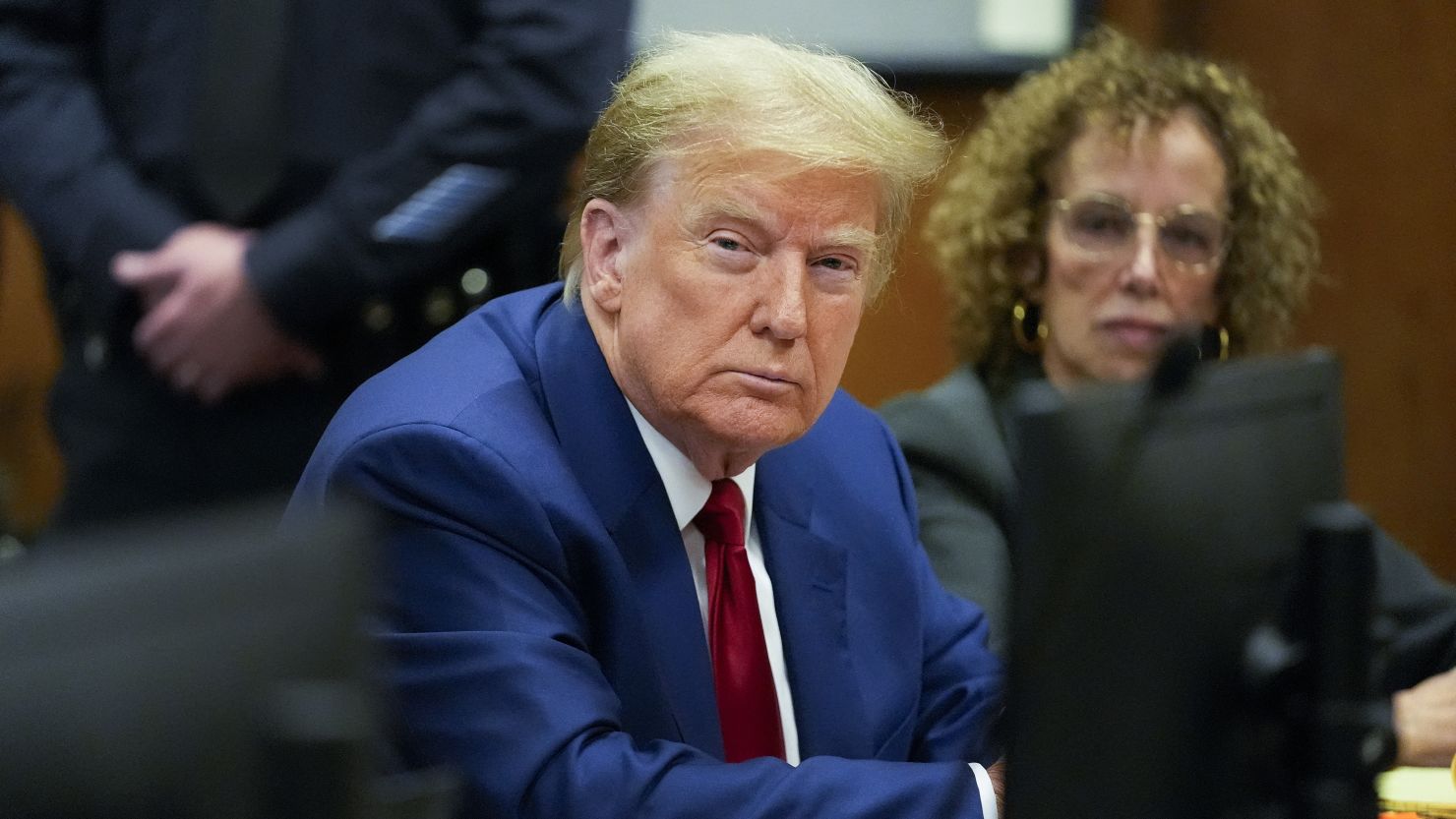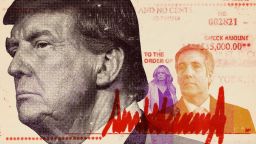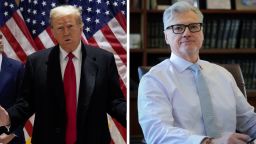Editor’s Note: Jeffrey Abramson is emeritus?professor of?government at the University of Texas at Austin and author of “We, The Jury: The Jury System and the Ideal of Democracy.” The views expressed in this commentary are his own. Read more opinion at CNN.
On Monday,?jury selection?for?the first-ever criminal trial?of a former US president begins in Manhattan. Former President Donald Trump, who has previously been found liable in?civil trials, is now set to face charges that?could land him in prison.

Trump is accused?of?34 counts of falsifying business records?in connection with a hush money payment his former lawyer and fixer, Michael Cohen, made to?adult-film actress Stephanie Clifford,?also known as?Stormy Daniels,?to cover up an alleged affair ahead of the 2016 election. (Trump?has pleaded not guilty.)
The verdict may well depend on whether the jury of 12 understands the gravity of the matter:?Far from being about sex or small-time fraud, it is about Trump’s?alleged attempt to win the 2016 presidential election by burying a last-minute story that could have cost him votes.?The case will require jurors to focus on the actual charges and not become distracted by the tawdry sexual details surrounding the case.
Impartiality is the?key to jury justice, but we can hardly expect jurors to approach the case without strong opinions about Trump. Indeed, it would be disturbing to seat jurors whose only qualification was their ignorance about major news events of the day.
Fortunately, an open mind does not require an empty mind.?We can find fair jurors who understand the difference between law and politics. The presiding judge, Juan Merchan, managed to seat just such a fair jury in?the 2022 trial of the Trump Organization. He can do so here as well, by following standard practice in New York and elsewhere of excusing persons for?hardship?and then probing the rest for bias during a process known as the?voir dire.
The process may take longer than the usual jury selection and the pool of persons questioned?will be larger. But otherwise, the process will be familiar. In?selecting?18 persons – 12 jurors and?six?alternates – each side can challenge an unlimited number of jurors for “cause,” namely bias. And even if the judge finds a potential juror impartial, New York law in a felony trial such as this gives Trump and the prosecution?10 peremptory strikes?each – the right to excuse a person for any reason at all, so long as the challenge?isn’t motivated by racial or equivalent forms of group prejudice.
Merchan has already released the?questionnaire?he will use to vet persons for bias. It consists of 42 questions in which he strikes a sensible balance between questions he will not allow – asking jurors how they vote or what their political party affiliation is – and inquiries he will permit;?for example, asking whether a potential juror supports groups such as the Proud Boys on the right or Antifa on the left.
Potential jurors can be asked whether they have ever attended pro-?or anti-Trump rallies or followed his social media posts or Cohen’s podcasts. Such questions will help detect those with the kind of extreme commitments that harden a juror’s mind before trial.
But there will be differences from normal New York practice. One is that the?names of jurors will be kept from the public, even though the parties will know them. Another is that?Merchan plans to take jurors who self-identify as biased at their word and?excuse them without the normal follow-up individual interview. He argues that such individual questioning would be?time-consuming and largely a charade?that would not change the need to excuse such persons.
Of course, a Manhattan trial venue favors the government, since? the borough chose Biden over Trump in the 2020 election by a?margin of 86% to 12%. There is something to be said for Trump’s claim that he faces an uphill battle in jury selection.
But for months now, Trump has tried to tilt the playing field by unleashing his own prejudicial pretrial publicity.?In the usual case, the defendant is the one who complains that media coverage has biased jurors. Indeed, Trump?lodged this complaint in arguing unsuccessfully for moving the trial from Manhattan or?postponing?it.
But this is a case where the defendant had as much access to the media as the government did. On social media, Trump called?Merchan?“a certified Trump hater”?and went so far as?to accuse the judge’s daughter?of working to “Get Trump,” in reference to her role in a firm that does digital campaign work for Democrats. As District?Attorney?Alvin Bragg?alleged in a court filing, Trump is the one who sought “to pollute the jury pool by making baseless and inflammatory accusations” about “witnesses, individual prosecutors, and the Court itself.”
Trump’s savvy when it comes to creating a media frenzy in his favor explains why the?juror questionnaire?specifically asks potential jurors whether they have ever “followed Donald Trump on any social media” or “have any feelings or opinions about how Mr. Trump is being treated in this case.”
It is a good guess that the prosecution will argue that frequent followers of Trump’s social media posts have been prejudiced beyond repair. It is an equally good surmise that Trump will counter by going after those who check the box next to The New York Times as their major source of news.?Each side plays hunches about what makes a juror more favorable to their side than the other.
One factor likely to complicate jury selection is the expected introduction into evidence of salacious sexual details about Trump’s alleged affair with Daniels, which he denies. Indeed, the prosecution is expected to buttress its case by showing Trump had an alleged pattern of paying hush money to cover up?sexual peccadillos, including with a former?Playboy model.
Typically, a defendant, especially a married man running for president, would prefer avoiding?the embarrassment and humiliation?of airing dirty laundry in public. But Trump may try a “what’s all the fuss about” defense and prefer jurors who dismiss the charges as an overblown reaction to just another sex story. Trump has?survived previous sex scandals?and he may prefer jurors predisposed to view the case as?one?about his private life?rather?than about important pubic matters.
True, another New York jury found Trump liable of?defaming and sexually abusing E. Jean Carroll in 2023?and again?this year. But there the jury faced evidence that the sex was coerced. The trial that begins today is about paying Daniels to keep quiet about an alleged consensual affair.
During jury selection, both sides will?also try to?anticipate how prospective jurors might react to the testimony of key prosecution witness, Cohen. He is the onetime Trump loyalist who flipped on his boss and?pled guilty?to charges stemming from falsifying records to conceal the?hush money?payments Trump allegedly asked him to make on his behalf to?Daniels.
Get Our Free Weekly Newsletter
- Sign up for CNN Opinion’s newsletter
- Join us on Twitter and Facebook
Trump has fiercely?attacked the credibility of Cohen,?and Cohen has?responded. This is why?Question 35?on the questionnaire asks what jurors know of their feud, including whether they have read or listened to any of Cohen’s books or podcasts.
Some jurors might have more trouble than others?believing the testimony of a convicted felon. Some might have negative reactions to someone who turned on a former boss. That is why each side might do well to sketch a personality profile of each?potential?juror.?A person who, through military training or otherwise, values loyalty above all else might make a pro-Trump juror, whereas the government?might?prefer the kind of person who admires whistleblowers and distrusts blind loyalty.
There is a famous quip of unknown origin that goes: “In England, the trial starts when jury selection is over. In the US, it is already over.”?It remains to be seen whether this proves true in a trial without precedent.


